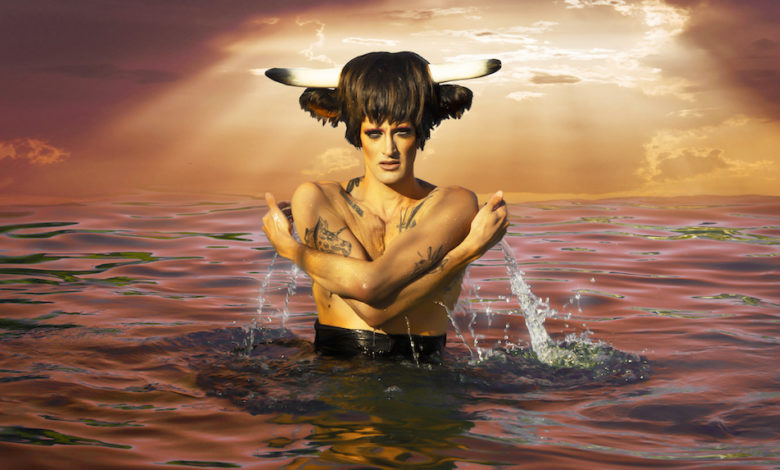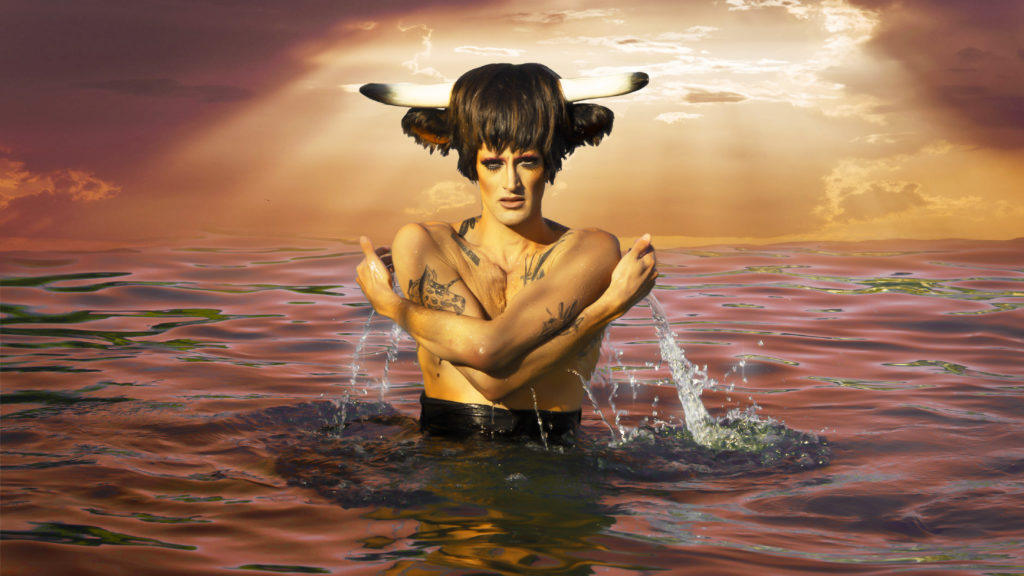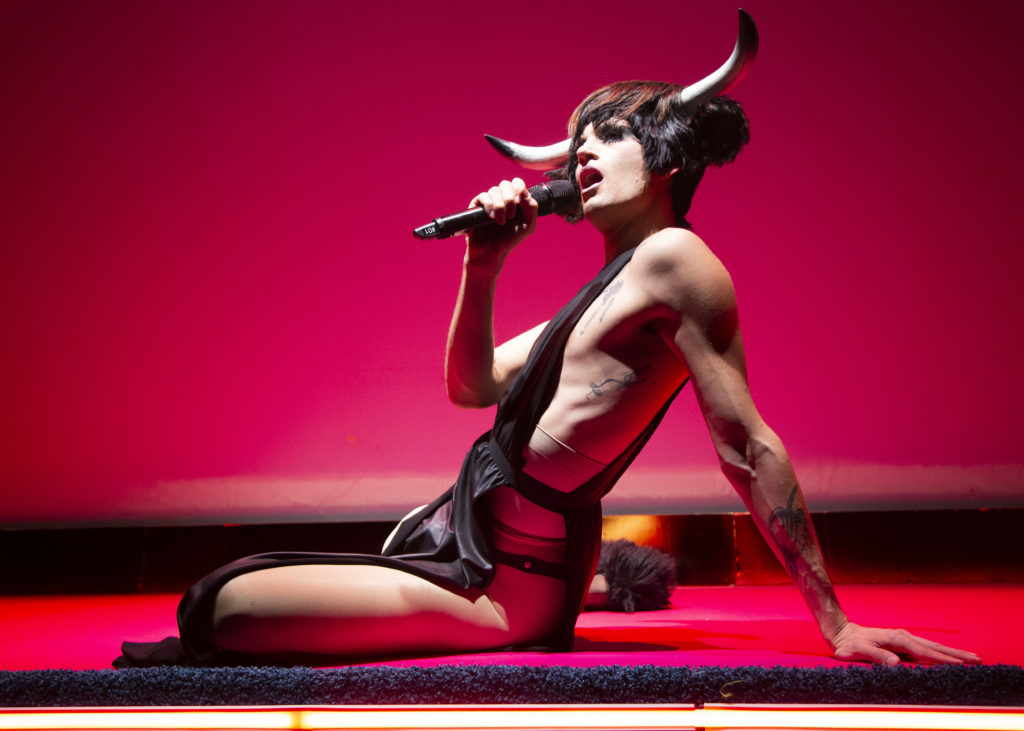
Soya the Cow Visits Houston
Get to know Daniel Hellmann’s alter-ego before taking in her feminist vegan drag show live.

Soya the Cow, a feminist, vegan, singing drag cow, is performing in Houston tonight. (No need to read that again—Soya is a drag cow!)
Soya is the brainchild and alter ego of 36-year-old Daniel Hellmann, a singer, performer, and dance and theater maker from Zurich who is based there and in Berlin. Soya the Cow blurs the boundaries between male and female, human and cow, and Hellmann uses her to inspire the kind of change he would like to see in the world.
In fact, he uses music and fashion, and performance to engage much-needed conversations about animal rights, climate activism, and feminism at animal rights and climate protests, in theaters and art festivals, and most recently on The Voice of Germany. Soya now has her own touring show, Dear Human Animals, which hits the Midtown Arts and Theater Center Houston (MATCH) in Matchbox 3 tonight at 8 p.m. The evening will be “full of emotional songs, surprising storytelling, and mesmerizing live visuals that will immerse you in Soya’s fascinating bovine universe.”
On Saturday at 5 p.m., Soya debuts her first exhibition, Planet Moo, at Rice University. The exhibition is on display through June 30. Hellman’s drag-cow persona stands for “a larger societal, economic, ecological, and ethical transition.” In other words, through Soya, Hellmann attempts to make “the unbearable more bearable and the unimaginable imaginable.”
In Dear Human Animals, Soya “playfully questions the relationship between humans and non-humans, between fast food and fast fashion, between those who eat and those who are turned into products and eaten. What would our lives look like if we stopped cutting each other into pieces? Can we be free if not everyone is free?”
Hellmann went to a university in Switzerland to study singing originally. “Classical music, and then I was a bit bored with that and I studied performance art and contemporary theater. And then I started making my own projects.”
OutSmart caught up with Hellmann to find out more about his work and his partner-in-crime Soya.
Jenny Block: When you were a kid, what did you want to be when you grew up?
Daniel Hellmann: I always want to be a drag cow.
If only!
No, no. Actually, I think my first big thing was I wanted to become a marine biologist because I loved whales and dolphins, even though Switzerland has no water, ocean, or sea. I did have a love for animals, always, I would say. And then I also started singing, very young, in the choir. Because I was the weird, queer kid in school, in choir I felt more like I had friends in my life. So I think that’s why the singing became important for me, because it was a safe environment somehow.
What is your relationship to the LGBTQ community?
So nowadays, I think things would’ve been a bit different for me because I grew up where there was so little representation. Being a homosexual man was weird and hard. So that’s basically that identity I think I kind of live into. But I became definitely more like a queer in the last years. But the boundaries between my work as Soya and Daniel might become more blurry.

Do you have a partner?
Yes, He’s a tattoo artist. He did most of my tattoos.
How did you go from you studying art, being in the choir, figuring out you’re queer, and now becoming a cow? How does this happen?
I started my own projects as an artist, writing and performing them myself and directing. And in the beginning, of all them were around topics of sexuality, gender, and sex work. I did a few projects around sex work and fighting for sex-worker rights. And somehow for me, that led to these reflections about who has the right to control somebody else.
So, I was like, “How can some things be so taboo that don’t harm anybody, and other things are literally like cutting somebody into pieces and that’s socially accepted?” So, I shifted somehow from fighting for sex-worker rights and queer rights to fighting for animals, because we don’t let them have their physical autonomy. We don’t let them be together with their families. We control every aspect of their lives.
And in that sense, I could say it was just an extension of my principles, like consent. I was an advocate for consent that people can do whatever they want in their bedroom as long as there is consent. The pigs don’t want to die and they show it very clearly, and there is no consent to take a pig and kill it. And so that’s kind of how my focus shifted in my work. But the art world was really not ready for it. I had censorship issues because of a scene that we reenacted with the artificial insemination of a cow.
What year was this when you were getting censored?
I had this project about meat. I turned myself vegan in the process. I didn’t know before that so many cows or chickens were killed in the egg or dairy industry, and how cruel it was. So I became vegan myself, and realizing I really didn’t know how to speak about it because nobody likes this sensation. People are just like, “Oh no, it’s annoying. Let me just eat my burger or my cheese.”
But if we change the perspective to see what it means to a chicken, we see it’s a 10-minute meal for us, but for the chicken it’s her whole life. So, I had this feeling of wanting to be an advocate for these animals because even though they fight, they fight every day in the farms, in the slaughterhouses. They’re trying to survive, but they have no chance.
So, I wanted to use my platform to speak about that. Then the difficulty was, how can I do that without everybody walking away, so I need something that catches the attention. I also need something fun, because it’s a dark topic and I see many activists having burnout. And then I found inspiration in drag kings and drag queens and drag monsters because I had a scholarship in San Francisco in 2017 and 2018 for six months. The drag scene there was so political. Trump was the newly elected president. And so there was so much rage that I was like, “Wow, if they are so outspoken about queer issues, about racial issues, about fascists, all these topics, maybe that’s what I have to do. I have to become someone who speaks about animals.” And then the idea just popped up that I want to become a drag cow.

Had you ever done drag before that?
A few times. I mean, I’ve always done the crossdressing theater stuff as a child. It’s fun. I love playing. My sister and I had these role-playing things. But proper drag, I had done it maybe four times with one of my best friends who was a drag queen in Berlin.
And then in the beginning, I didn’t know that it would become a real thing for years. It has been out four years. I have recorded an album with my own songs, with music videos. I have written a one-cow theater play. I have made an exhibition now that is in different cities in the U.S. I’ve been on Voice of Germany.
So my cow character is growing and growing, and it allows me to do activism and art and meet amazing people. And yeah, it’s a beautiful journey. And what I love about it is that I feel like it can make people think. It can challenge people. It can also provoke them, but it’s still beautiful. It’s still funny. And in the end, it’s an invitation for people to change their perspective and maybe think what it would be like to be a cow.
I mean, this is what we do to animals. We kind of take their bodies and take their individuality away and just treat them like a mere object.
So I’m playing with the idea that the objectification of animals is also the objectification of women or other people. I’m interested in these parallels because in our oppressive system they do have things in common—who is valued, who is deemed unvalued, who has the right to live freely, who doesn’t have the right to live freely. Why do we pet dogs but abuse children?
I also want to show that we have something in common. We usually talk about our common humanity, but what I want to show is we also have something in common that is our animality. As humans, we are also animals. We all have joy, we have fears, we have friendships, we have feelings for our friends and our families.
So many animals, they are so family oriented, but we destroy their families. And it’s cruel. And some animals and cows cry for days when they take their babies away. And so there’s all these practices that people are not aware of. You just have the product, and we completely disassociate it from the real animal. For me, it’s very hard, but drag helps me to keep the moment and not get depressed, basically.
I also connect a lot with the climate crisis. The foods that we eat and the food we produce is one of the major causes of the climate crisis. It’s very depressing, so putting on a clown face helps.
My songs are very emotional. They talk about death. They talk about loss and in a way that it’s about animals, but it’s also about other things, like I have a very sick mom now, and losing somebody you love is terrible. And these big questions about life and death and pain and also joy and spirituality—all these things kind of come together for me in this project. So it has this kind of silly side. It also has a very deep and fragile personal side.
How do you personally define what art is?
I have a love-hate relationship with art. I always try to do activism next to my art, but I have so much admiration for people who do the policy work. It’s tiring. People who are in the animal sanctuary taking care of animals every single day, I have the utmost respect for these people, for teachers who teach new ways of thinking.
So, I think, if you want change in the world, we need all levels. We need the artists and the politicians and the workers, the care workers and the media people. We need every aspect of society. And I think it’s really important that as artists, we are in touch with other groups, but for me, what I love about process of art making it’s kind of how to live a creative life, and this can be when I cook, it can be with a photo I am shooting where I’m wearing a dress made out of cabbage. I don’t want to just create something beautiful. I also want to create something that has the potential to really change our behaviors, change our mindsets, change how we live together. And usually it doesn’t work out, so then I just try again.
That’s all you can do.
Exactly.
I’m imagining that since you’ve come up against some protest, not everyone gets it at first glance. So if you had two minutes in an elevator with someone who at first was like, “What?” what would you want to share about your work that might help them to at least have a look at it?
“Out of despair and frustration with how the world is, I have created this fantasy character who is a drag cow—obviously queer, obviously vegan—who uses whatever skills she has to fight for a world that is more joyful and more compassionate, through photography, video art, theater, music, public protests, and conversations with people.”
Is there anything else you want to share?
For me, being in Texas for the first time is quite funny because everybody knows Texas cowboys. There’s something about being here as a queer, vegan drag cow that I just find beautiful, and that there is space for this. And I’m excited to meet all the wonderful people that are here. I’m sure there are those who want to censor my picture, but there’s also a bunch more people who don’t. And I’m excited to meet all of them.
For sure. Those are the best ones.
We are going to visit Rowdy Girl Sanctuary, which is a former cattle ranch that became a sanctuary for cows. So the cows there can just live without being exploited. And we are going to visit this place and take some photos, of course. And at the show on Friday, all the funds that come in go to this place so that they can continue their amazing and inspiring work showing that they can still live with animals without harming or exploiting them.
I try to always meet some local activists or other queer artists. Queer artists from Houston, please show up! I want to meet you. Every project I do changes my life so much. It’s almost exhausting. I mean, the cow has completely taken over my life. I’m happy. It’s not a bad thing, but it’s still taking over.
Dear Human Animals will take place at Midtown Arts and Theater Center Houston (MATCH) in Matchbox 3 on Friday, May 20, at 8:00 p.m. Dear Human Animals is part of a larger nationwide tour that includes performances, exhibitions, and artist talks in Seattle, Houston, Los Angeles and Kansas City. Soya the Cow’s performance Dear Human Animals is made possible with the support of Goethe Pop Up Houston, Pro Helvetia–Swiss Arts Council, Stadt Zürich Kultur & Fachstelle Kultur Kanton Zürich.
For more information, visit goethe.de/houston.











Comments